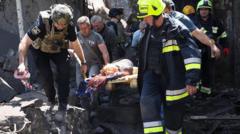Despite a ceasefire being announced between Israel and Iran, mutual accusations of violations have arisen, with President Trump criticizing both nations for continued military actions. The agreement, brokered with assistance from Qatar, remains tenuous as leaders globally react to the unfolding situation.
Tensions Flare as Ceasefire Between Israel and Iran Faces Challenges

Tensions Flare as Ceasefire Between Israel and Iran Faces Challenges
President Trump expresses frustration as both countries launch attacks following a ceasefire, highlighting the fragile state of the agreement.
As of June 24, 2025, President Trump strongly criticized Israel and Iran for engaging in military actions after a ceasefire was announced, demonstrating the delicate and fractured nature of the agreement meant to halt over a week of intense conflict. In statements filled with frustration, Trump indicated that he was “not happy” with either nation, specifically noting Israel's quickly executed aerial bombardments post-agreement. He highlighted the absurdity of both countries’ behaviors, suggesting they are locked in a cycle of retaliation without clear intent or strategy.
Israel's Prime Minister Benjamin Netanyahu reported that Iran had launched missiles after the ceasefire came into effect, prompting retaliatory strikes against Iranian sites. In contrast, Iran's military denied they fired any missiles post-ceasefire, each nation framing their actions within a context that preserves their narrative of having acted in self-defense.
Global reactions to the ceasefire have been rife with caution. Leaders from various countries, including France and Russia, acknowledged the fragile peace, underscoring the potential for further escalation. The markets reacted positively to the ceasefire announcements, reflecting hopes for decreased tensions in the region.
On the ground, reports of ongoing violence complicate the ceasefire narrative. In southern Israel, an Iranian missile strike killed four citizens just hours before the truce was to take effect, while Israeli airstrikes were reported targeting Iranian sites in Tehran. The heavy bombardments on both sides were characterized by a dissonance in timelines and conflicting accounts of what occurred when.
In a complex layer to this geopolitics, Qatar emerged as a key mediator, reportedly facilitating discussions and helping to broker the ceasefire agreement—a reflection of its strategic regional alliances despite the pressures stemming from its proximity to Iran and the United States.
Despite the ceasefire being publicly hailed, both nations appear cautious, with each side maneuvering in a way that suggests a strong desire to avoid further escalation, yet unwilling or unable to fully commit to the terms laid out. The broader implications of this conflict, as well as Trump's defined role as a broker, continue to unfold, as both nations operate under heavy scrutiny from global observers.
As tensions fluctuate, the international community remains on high alert, with calls for genuine diplomatic engagement at the forefront of the discourse surrounding this complex Middle Eastern struggle.
Israel's Prime Minister Benjamin Netanyahu reported that Iran had launched missiles after the ceasefire came into effect, prompting retaliatory strikes against Iranian sites. In contrast, Iran's military denied they fired any missiles post-ceasefire, each nation framing their actions within a context that preserves their narrative of having acted in self-defense.
Global reactions to the ceasefire have been rife with caution. Leaders from various countries, including France and Russia, acknowledged the fragile peace, underscoring the potential for further escalation. The markets reacted positively to the ceasefire announcements, reflecting hopes for decreased tensions in the region.
On the ground, reports of ongoing violence complicate the ceasefire narrative. In southern Israel, an Iranian missile strike killed four citizens just hours before the truce was to take effect, while Israeli airstrikes were reported targeting Iranian sites in Tehran. The heavy bombardments on both sides were characterized by a dissonance in timelines and conflicting accounts of what occurred when.
In a complex layer to this geopolitics, Qatar emerged as a key mediator, reportedly facilitating discussions and helping to broker the ceasefire agreement—a reflection of its strategic regional alliances despite the pressures stemming from its proximity to Iran and the United States.
Despite the ceasefire being publicly hailed, both nations appear cautious, with each side maneuvering in a way that suggests a strong desire to avoid further escalation, yet unwilling or unable to fully commit to the terms laid out. The broader implications of this conflict, as well as Trump's defined role as a broker, continue to unfold, as both nations operate under heavy scrutiny from global observers.
As tensions fluctuate, the international community remains on high alert, with calls for genuine diplomatic engagement at the forefront of the discourse surrounding this complex Middle Eastern struggle.























